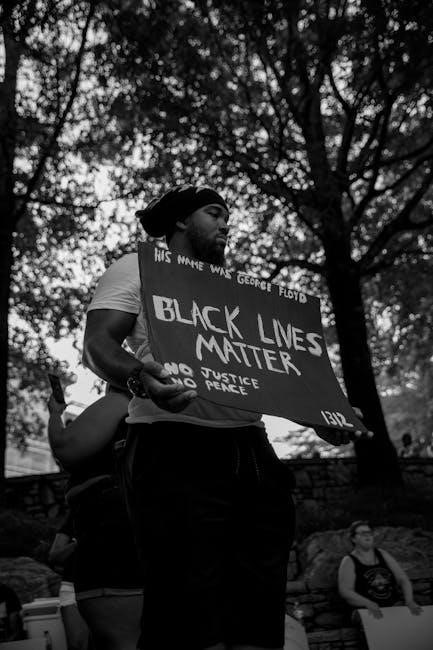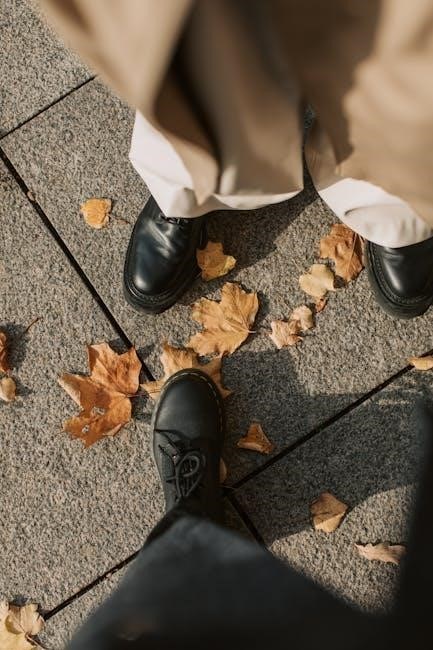A motion to change venue is a legal document requesting a trial’s relocation to ensure impartiality. It is crucial for fairness in legal proceedings.
1.1 Definition of a Motion to Change Venue
A motion to change venue is a legal document requesting the transfer of a case to a different court location. It is filed when the current venue may prevent a fair trial due to bias, prejudice, or logistical challenges. The motion outlines reasons for relocation and is a formal request to the court for approval.
1.2 Importance of Venue in Legal Proceedings
The venue in legal proceedings ensures fairness and impartiality, as it determines where a case is heard. It impacts jury selection, witness accessibility, and evidence presentation. A neutral location helps prevent bias, ensuring all parties receive a fair trial. Logistical challenges and public perception also influence venue decisions, making it a critical factor in maintaining justice and procedural integrity.

Understanding the Purpose of a Motion to Change Venue
A motion to change venue addresses concerns about bias or prejudice in the current location, aiming to relocate the trial for an impartial jury and fair proceedings.
2.1 Reasons for Filing a Motion to Change Venue
Parties may file a motion to change venue due to extensive pretrial publicity, potential juror bias, or conflicts of interest. Ensuring an impartial jury and a fair trial are primary motivations, as seen in high-profile cases where local sentiments could impact outcomes. This legal strategy aims to relocate proceedings to a more neutral environment.
2.2 Impact of Venue on Jury Selection
The venue significantly influences jury selection, as local biases or exposure to pretrial publicity can affect juror impartiality. A change of venue may be sought to relocate the trial to an area with a more neutral jury pool, ensuring a fair trial. High-profile cases often highlight this concern, where extensive media coverage compromises juror objectivity in the original venue.
2.3 Role of Venue in Ensuring a Fair Trial
Venue plays a critical role in ensuring a fair trial by preventing local biases or external influences from swaying the outcome. A neutral location helps maintain judicial impartiality, reducing the risk of prejudice. Courts may grant a change of venue to safeguard the defendant’s right to an unbiased trial, as mandated by law, ensuring justice is served without external interference or community pressure.

Eligibility Criteria for Filing a Motion to Change Venue
Filing a motion requires legal grounds, such as bias or inconvenience. Specific requirements and time constraints must be met to qualify for a venue change.
3.1 Legal Grounds for Changing Venue
Legal grounds for changing venue include bias, prejudice, or inconvenience. The court may grant a change if the current location hinders a fair trial or causes undue hardship.
3.2 Requirements for Submitting a Motion
Submitting a motion to change venue requires completing a PDF form and providing supporting evidence. The form must include details about the case, reasons for the change, and the proposed venue. It must be filed within the court’s specified deadline and served to all parties involved in the case.
3.3 Time Constraints for Filing the Motion
Filing a motion to change venue must adhere to strict deadlines, typically requiring submission well in advance of the trial date. Courts often mandate that such motions be filed at least 30 days before the scheduled trial. Failure to meet this deadline may result in dismissal or denial of the motion, potentially impacting the case’s outcome.

The Process of Filing a Motion to Change Venue
The process involves preparing the motion, submitting it to the court, and serving all parties. It requires adherence to specific legal procedures and timelines to ensure validity.
4.1 Preparing the Motion Document
Preparing the motion document involves drafting a clear, concise request stating the reasons for the venue change. It must include legal grounds, relevant evidence, and comply with court formatting requirements. Properly completed forms, such as JDF 1323, are essential to ensure the document is accepted by the court. Accuracy and adherence to local rules are critical to avoid delays or dismissal.
4.2 Submitting the Motion to the Court
Submitting the motion involves filing the completed document with the court clerk, ensuring compliance with local rules. The motion must be accompanied by required fees and supporting documents. Once filed, the court reviews the request to determine if a hearing is necessary. Timely submission is crucial to avoid procedural delays. Proper filing ensures the motion is considered by the court.
4.3 Serving the Motion to All Parties Involved
Serving the motion ensures all parties are notified. This is done via mail, personal delivery, or electronic filing, depending on court rules. Proof of service must be filed with the court. Proper service guarantees all parties have notice and an opportunity to respond. Timely and correct service is essential to maintain procedural integrity and fairness in the legal process.
Required Documentation for a Motion to Change Venue
The motion requires specific forms, templates, and supporting documents. Accuracy and compliance with court standards are essential to ensure the motion is properly processed and considered.
5.1 Necessary Forms and Templates
The motion to change venue requires specific forms, such as the JDF 1323 for state cases or EOIR-33 for immigration matters. These templates ensure proper formatting and compliance with court rules. They typically include fields for case details, reasons for the venue change, and supporting arguments. Accuracy in completing these forms is critical to avoid delays or rejection by the court.
5;2 Supporting Evidence and Affidavits
Submitting a motion to change venue requires supporting evidence, such as news articles, affidavits, or witness statements, to demonstrate bias or other compelling reasons. Documentation must be attached to the JDF 1323 or EOIR-33 form, depending on the case type. Each family member in immigration cases must submit a separate Form EOIR-33. Missing deadlines or omitting critical documents can result in the motion being denied.
5.3 Court Fees and Additional Requirements
Filing a motion to change venue often requires court fees, which vary by jurisdiction. Additional requirements include completing forms like JDF 1323 or EOIR-33, paying applicable fees, and ensuring proper service of the motion to all parties. Failure to meet deadlines or submit complete documentation can lead to denial. Accuracy and adherence to local court rules are essential for a successful filing process.
The Role of the Court in Deciding the Motion
The court evaluates motions to change venue based on impartiality and fairness. Judges consider factors like pretrial publicity, potential jury bias, and logistical challenges before ruling.
6.1 Judicial Discretion in Venue Changes
Judges exercise significant discretion when deciding motions to change venue, weighing factors like pretrial publicity, juror impartiality, and logistical challenges. Courts prioritize fairness, ensuring an unbiased trial environment. Decisions are based on evidence presented, with judges denying motions if they find no compelling reason to relocate the case, as seen in Karina Cooper’s denied request despite concerns about jury bias.
6.2 Factors Considered by the Court
Courts evaluate motions to change venue based on pretrial publicity, juror impartiality, and logistical challenges. Judges assess whether extensive media coverage could bias the jury or if the current location poses unfair challenges. They also consider the practicality of relocating the trial, weighing the potential benefits against the costs and disruptions. The court ultimately decides if the current venue can still ensure a fair trial.
6.3 Potential Outcomes of the Motion
The court may grant, deny, or partially grant the motion to change venue. If granted, the trial relocates to a new venue deemed fair. If denied, proceedings continue in the original location. The decision hinges on factors like pretrial publicity, juror bias, and logistical feasibility. The court’s ruling aims to ensure a fair trial while balancing practical considerations and legal standards.

The Motion to Change Venue PDF Form
The motion to change venue PDF form is a crucial document for requesting a trial location change. It is available in both Word and PDF formats for easy access and submission to the court, ensuring clarity and accuracy in the request.
7.1 Structure of the Motion to Change Venue Form
The motion to change venue form typically includes sections for case details, parties involved, and the reason for the venue change. It also provides fields for the requested venue and supporting documents. The structure ensures all necessary information is clearly presented, facilitating the court’s review and decision-making process efficiently.
7.2 Instructions for Completing the Form
Download the motion to change venue template (e.g., JDF 1323) and fill in all required fields, including case details, party information, and the reason for the venue change. Use clear and concise language, ensuring accuracy. Attach supporting documents if necessary. Proofread the form to avoid errors before submission to the court.
7.3 Importance of Accuracy in the Form
Accuracy in completing the motion to change venue form is crucial to avoid delays or dismissal. Errors can result in denied requests, impacting trial strategy and fairness. Ensure all details are correct, and legal standards are met to maintain the integrity of the process and uphold justice.
Legal Considerations and Implications
A denied motion to change venue can impact trial fairness and strategy, potentially leading to appeals if the court’s decision is deemed biased or unjust;
8.1 Consequences of a Denied Motion
A denied motion to change venue may result in a potentially biased jury, undermining the fairness of the trial. The case will proceed in the original venue, which could impact the defendant’s right to an impartial hearing. This outcome may also influence trial strategy and could lead to appeals if the court’s decision is challenged as unjust or prejudicial.
8.2 Impact on Trial Strategy
A denied motion to change venue may force the defense to adapt its strategy, such as intensifying jury selection efforts or addressing pretrial publicity. The legal team might need to adjust evidence presentation or consider alternative defense approaches. This shift could also influence settlement negotiations or the decision to file an appeal based on perceived biases in the original venue.
8.3 Potential for Appeal
If a motion to change venue is denied, it may serve as grounds for appeal, arguing that the trial location prejudiced the outcome. Appellate courts review whether the denial violated due process or led to an unfair trial. Successful appeals could result in a retrial in a different venue, emphasizing the importance of thoroughly documenting the initial motion’s rationale.

Case Studies and Examples
High-profile cases like Karina Cooper’s denied motion and Brandon Kasemeier’s twice-denied request highlight the challenges and outcomes of venue change attempts, illustrating real-world legal strategies;
9.1 High-Profile Cases Involving Venue Changes
Notable cases, such as Karina Cooper’s denied motion and Brandon Kasemeier’s twice-rejected request, demonstrate the challenges of changing venues. These high-profile examples highlight strategic attempts to ensure impartial juries and fair trials, showcasing the legal system’s scrutiny of such motions and their significant impact on case outcomes.
9.2 Successful and Unsuccessful Motions
Some motions to change venue succeed, like Colt Gray’s case in Barrow County, where extensive publicity led to a venue change. Others, such as Karina Cooper’s and Brandon Kasemeier’s motions, were denied, emphasizing the court’s strict criteria for granting such requests and the varying outcomes based on case specifics and judicial discretion.
9.3 Lessons Learned from Past Cases
Past cases reveal that successful venue changes often hinge on demonstrating significant pretrial publicity or logistical challenges. Unsuccessful motions highlight the need for strong evidence of bias or hardship. Attorneys must carefully prepare and time their requests, understanding that courts prioritize impartiality and efficiency. These lessons emphasize the importance of strategic planning and thorough documentation in motion preparation.
Resources and Templates
Official government websites and legal aid organizations provide downloadable Motion to Change Venue templates, including PDF forms like EOIR-33 for immigration cases, ensuring proper formatting and compliance.
10.1 Where to Find Motion to Change Venue Templates
Official government websites, legal aid organizations, and court websites offer downloadable templates for motions to change venue, including PDF forms such as JDF 1323 and EOIR-33. These documents are designed to meet specific court requirements and ensure proper formatting and compliance with legal standards.
10.2 Legal Resources for Assistance
Legal resources for assistance include official government websites, legal aid organizations, and court websites. These platforms provide access to forms, guides, and templates for filing a motion to change venue. Additionally, organizations like the Asylum Seeker Advocacy Project offer specialized resources for immigration-related venue changes, ensuring individuals have the necessary tools to navigate the legal process effectively.
10.3 Online Tools for Filing the Motion
Online tools such as PDF editors and legal platforms simplify the filing process. Websites like pdfFiller offer templates for motions to change venue, enabling users to complete and submit forms electronically. These tools often include guidance for accurate form completion, ensuring compliance with court requirements and streamlining the submission process for efficiency and convenience.

Recent Trends and Updates
Recent trends include updates in venue change laws, the impact of COVID-19 on procedures, and technological tools like electronic filing and digital signatures for motions, enhancing efficiency and accessibility for legal practitioners and clients.
11.1 Changes in Venue Change Laws
Recent updates to venue change laws include adjustments for COVID-19, such as remote hearings and extended filing deadlines. Courts now prioritize electronic submissions and digital signatures, streamlining the process. These changes aim to enhance accessibility and efficiency while maintaining legal integrity, ensuring fairness and adaptability in modern legal proceedings.
11.2 Impact of COVID-19 on Venue Procedures
COVID-19 significantly altered venue procedures, with courts adopting remote hearings and virtual trials to maintain safety. Extended filing deadlines and electronic submissions became standard. Videoconference tools facilitated proceedings, ensuring continuity despite restrictions. These measures aimed to balance public health concerns with the need for judicial efficiency, reshaping how motions to change venue are handled in the pandemic era.
11.3 Technological Advances in Filing Motions
Technological advancements have streamlined the process of filing motions to change venue. Electronic filing systems, such as e-filing platforms, now allow parties to submit documents digitally, reducing the need for physical appearances. PDF forms and online portals have made it easier to prepare and submit motions, enhancing efficiency and accessibility for all parties involved in legal proceedings.

State-Specific Variations
State-specific variations exist in filing motions to change venue, with unique rules and procedures in each jurisdiction, impacting how motions are processed and decided.
12.1 Differences in State Laws
State laws vary significantly regarding motions to change venue, with specific forms and requirements differing across jurisdictions. For example, Colorado uses JDF 1323, while Minnesota and Wisconsin have distinct processes. Arizona and Texas also have unique rules, emphasizing local court procedures. These variations highlight the importance of understanding state-specific legal frameworks when preparing a motion to change venue PDF.
12.2 Local Court Rules and Procedures
Local court rules significantly influence the process of filing a motion to change venue. Each jurisdiction may require specific forms, such as Colorado’s JDF 1323, and adhere to unique procedural timelines. Non-compliance with local rules can lead to delays or rejection of the motion. Understanding these nuances is crucial for a successful venue change request, as procedures vary widely by court.
12.3 Regional Considerations
Regional considerations play a key role in determining the success of a motion to change venue. Different areas may have unique factors influencing venue decisions, such as local jury pool dynamics or urban vs. rural distinctions. Courts in regions with extensive publicity may grant venue changes to ensure impartiality, while others may deny them based on specific legal standards. Understanding these regional nuances is essential for a fair trial.
A motion to change venue is a critical legal tool ensuring fairness and impartiality in trials. Its proper use balances justice and legal strategy effectively.
13.1 Summary of Key Points
A motion to change venue is a legal tool ensuring trials occur in fair, impartial settings. Properly filed, it balances justice, strategy, and logistical needs, maintaining procedural integrity while addressing concerns like jury bias or convenience, ultimately safeguarding the rights of all parties involved in legal proceedings.
13.2 Final Thoughts on Motion to Change Venue
A motion to change venue is a strategic legal tool ensuring fairness and impartiality in trials. By addressing concerns like jury bias or logistical challenges, it balances justice and court efficiency. Properly prepared and supported, it can significantly impact trial outcomes, making it a valuable resource for maintaining procedural integrity and safeguarding legal rights.
